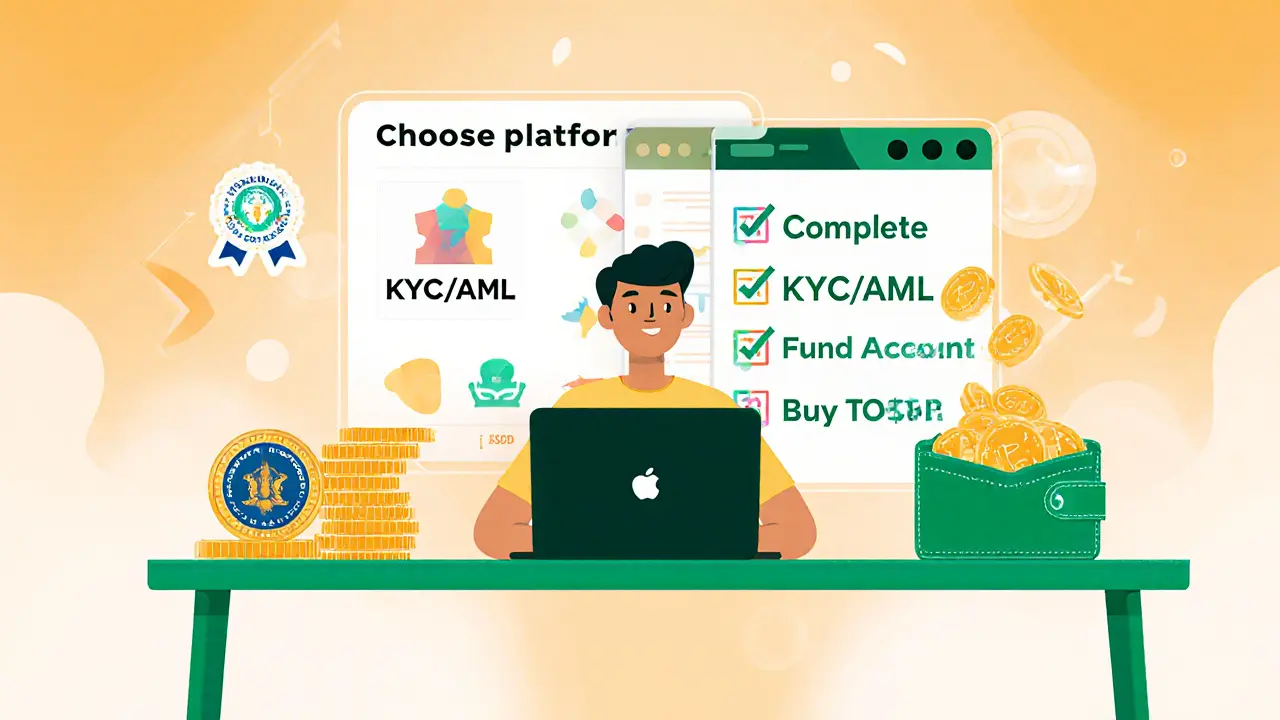Security Token Fractional Investment Calculator
Investment Calculator
See how much of a tokenized asset you can own based on your investment amount
Why This Matters
Security tokens let you own fractional shares of high-value assets like real estate, art, or commodities. The calculator shows how your investment translates to actual ownership percentage.
Your Ownership
This represents your fractional ownership in the asset. With security tokens, you can:
- Own real estate for under $100
- Receive automatic dividend payouts
- Trade 24/7 on regulated exchanges
When we talk about Security Token a digital security that represents ownership in real‑world assets and is issued on a blockchain, we’re merging traditional finance with crypto tech. If you’ve been watching the buzz around tokenized investments and wonder how to actually get a piece of the action, this guide walks you through everything you need to know to start investing in 2025.
Quick Summary
- Security tokens are blockchain‑based securities that blend real‑world assets with crypto benefits.
- Pick a compliant tokenization platform, complete KYC/AML, fund your account, and buy fractional tokens.
- Ethereum remains the dominant chain for compliant tokens, but other networks are emerging.
- Watch regulatory rules from the SEC and know whether you qualify as an accredited investor.
- Start with low‑cost real‑estate or equity tokens before expanding to commodities or art.
What Exactly Is a Security Token?
A Security Token digital representation of a traditional security such as a share, bond, or real‑estate interest, secured by smart‑contract code gives you legal ownership rights while living on a blockchain. Unlike utility tokens, which grant access to a service, security tokens are subject to securities law, meaning they come with investor protections, dividend rights, and regulated trading venues.
Why Invest in Security Tokens?
Because they combine the safety of regulated assets with the speed and fractionality of crypto. You can own a slice of a $10million office building for under $100, settle trades in minutes, and see real‑time updates on your portfolio. The programmable nature of Smart Contract self‑executing code that enforces the token’s rules on-chain also automates dividend payouts and ownership transfers, cutting out middlemen and paperwork.
Step‑by‑Step: How to Start Investing
- Choose a compliant platform. Look for services that integrate KYC/AML, custodial solutions, and connections to regulated exchanges.
- Complete the KYC Know‑Your‑Customer verification required by regulators and AML checks. This usually involves uploading ID, proof of address, and answering a few financial‑status questions.
- Fund your account. Most platforms accept bank transfers, wire payments, or approved cryptocurrency deposits such as USDC.
- Browse the token catalogue. Platforms list tokenized assets ranging from Real Estate Token fractional ownership of property represented on‑chain to equity shares of startups.
- Select the amount you want to buy. Fractional buying lets you invest as little as $10 in a $5million property.
- Confirm the transaction. The platform’s smart contract locks your funds and issues the token to your wallet.
- Manage and trade. You can hold the token for dividends or sell on a secondary market, which operates 24/7 on regulated digital exchanges.

Choosing the Right Platform - A Quick Comparison
| Platform | Compliance Backbone | Asset Variety | Fees (Average) | Custody Option |
|---|---|---|---|---|
| Tokeny | Built‑in KYC / AML | Real estate, equity, commodities | 1.2% per transaction | Segregated, insured custodial wallets |
| Securitize | SEC‑registered, extensive legal review | Equity, debt, venture‑stage tokens | 0.8% + $15 flat fee | Cold‑storage + multi‑sig |
| Polymath | Automated on‑chain compliance logic | Wide‑range (art, IP, gaming) | 1.0% + gas fees | Integrated with major custodians |
Asset Classes You Can Tokenize
Beyond the classic real‑estate and equity tokens, the market now offers:
- Commodities: Gold or oil barrels sliced into micro‑tokens.
- Art: Shares of a Monet painting, tradable on niche exchanges.
- Intellectual Property: Future royalties from a patent tokenized for investors.
- Revenue Streams: A small SaaS business sells a percentage of its monthly cash flow as tokens.
Regulatory Landscape in 2025
The U.S. SEC U.S. Securities and Exchange Commission, regulator of securities markets released definitive guidance last year, confirming that any token that promises profit from the efforts of a central team is a security. That means most STO Security Token Offering, a regulated fundraising method must follow the same registration or exemption rules as a traditional IPO.
Investor eligibility varies:
- Accredited Investor person meeting wealth or income thresholds defined by the SEC can access most private STOs.
- In the EU and Singapore, certain retail‑friendly token offerings are allowed under licensed platforms.
Always verify that the platform you choose is registered with the relevant regulator (e.g., FINMA in Switzerland or the FCA in the UK) before committing funds.
Risks and Best‑Practice Tips
Even though security tokens promise transparency, they still carry risks:
- Liquidity risk: Not every token has an active secondary market. Check the average daily volume before buying.
- Smart‑contract bugs: Flaws in the code could freeze assets. Prefer tokens audited by reputable firms.
- Regulatory shifts: Laws can change, affecting token tradability in your jurisdiction.
- Tax compliance: Treat token gains as capital gains or income depending on local tax codes.
Mitigation steps: diversify across asset classes, use platforms with insurance on custodial holdings, and keep a record of every transaction for tax reporting.
Next Steps & Troubleshooting
If you hit a snag during onboarding, try these quick fixes:
- Verification delay: Ensure your document images are clear and all fields are filled. Some platforms require a selfie for facial verification.
- Funding rejected: Double‑check the beneficiary bank details and confirm that your bank allows outbound international transfers.
- Token not visible in wallet: Add the token’s contract address manually; most wallets let you import custom ERC‑20 tokens.
- Trading frozen: Verify that you meet any holding‑period restrictions encoded in the token’s smart contract.
Once everything lines up, you’ll be able to watch your portfolio grow in real time, receive automated dividend payouts, and sell portions whenever you like.
Frequently Asked Questions
Do I need a crypto wallet to hold security tokens?
Yes. Most platforms provide a custodial wallet, but you can also transfer tokens to a non‑custodial wallet that supports the token’s blockchain (e.g., an ERC‑20 compatible wallet for Ethereum‑based tokens).
Can I trade security tokens on regular crypto exchanges?
Only on regulated exchanges that have been granted permission to list security tokens. Unregulated venues may breach securities law.
What’s the difference between a security token and a utility token?
Security tokens represent ownership or a financial claim and are subject to securities regulation. Utility tokens give access to a product or service and are not considered securities if they lack profit‑sharing features.
Are dividends paid automatically?
When the token’s smart contract includes dividend logic, payouts are auto‑distributed to token holders’ wallets, usually in stablecoins or the underlying asset.
Do security tokens have the same tax treatment as regular stocks?
Tax authorities generally treat gains from security tokens like any other capital asset, but you should consult a tax professional for jurisdiction‑specific rules, especially regarding dividend income.
Ready to dip your toes in? The world of tokenized finance is opening doors that were once closed to everyday investors. With the right platform, compliance checks, and a clear strategy, you can start building a diversified portfolio of security tokens today.

Miguel Terán
August 11, 2025 AT 17:24Security tokens are like cultural bridges that let everyday people step into the halls of high finance without the usual velvet rope. They combine the solidity of real‑world assets with the nimbleness of blockchain technology. Imagine owning a slice of a skyscraper in Manhattan while sipping chai in Delhi, all recorded on a public ledger. The tokenization process strips away geography, allowing investors from Miami to Mumbai to share in the same asset class. Because each token is backed by a legal claim, regulators can treat it similarly to a stock, which adds a layer of protection that pure crypto often lacks. Fractional ownership means you can start with a hundred dollars instead of a hundred thousand, democratizing access like never before. Smart contracts automate dividend distribution, so you get your share of rental income without a middleman filing paperwork. The underlying blockchain, usually Ethereum, ensures transparency; every transfer is immutable and can be audited in seconds. Compliance modules built into platforms handle KYC and AML, so you don’t have to chase paperwork across continents. As the market matures, secondary liquidity pools are emerging, giving you the ability to sell a portion of your token whenever the market is favorable. Regulatory clarity is improving, with the SEC publishing guidance that helps platforms stay on the right side of the law. Investors should still watch for smart‑contract bugs, but reputable projects undergo rigorous audits by firms like OpenZeppelin. Diversification across asset classes-real estate, art, commodities-spreads risk and enhances returns. In short, security tokens are the passport that lets you travel the financial world without a visa. Embrace the technology, do your due diligence, and you might find that the future of investing feels both familiar and exciting.
Shivani Chauhan
August 18, 2025 AT 16:04Thanks for laying out the big picture so clearly; the step‑by‑step breakdown really helps beginners navigate the compliance maze.
Deborah de Beurs
August 25, 2025 AT 14:44Honestly this whole token hype is just a slick marketing gimmick that pretends to democratize wealth while lining the pockets of platform founders, and anyone who falls for it is practically handing over cash to a digital pyramid.
Sara Stewart
September 1, 2025 AT 13:24While I see where you’re coming from, the reality is that reputable STOs leverage Reg‑A+ exemptions, custodial escrow, and on‑chain KYC to mitigate exactly those risks you mentioned, making the ecosystem far more robust than the “pyramid” narrative suggests.
Laura Hoch
September 8, 2025 AT 12:04Investing in tokenized assets invites us to rethink ownership as a fluid, shared experience rather than a static claim, and that shift challenges the age‑old notion that wealth must be hoarded behind closed doors.
Devi Jaga
September 15, 2025 AT 10:44Sure, let’s all jump on the “future of finance” bandwagon, because adding another layer of blockchain jargon to traditional securities is exactly what the market needed to solve all its problems.
Hailey M.
September 22, 2025 AT 09:24Oh great, another “step‑by‑step” guide that promises you’ll be swimming in dividend‑paying tokens by Friday 🌊💸-because we all know the crypto world never crashes, right?
Jason Zila
September 29, 2025 AT 08:04What you need is a clear risk‑adjusted return model before committing capital.
Cecilia Cecilia
October 6, 2025 AT 06:44The token’s legal framework determines its enforceability and tax treatment.
lida norman
October 13, 2025 AT 05:24Totally love how security tokens can make real estate feel like a video game 🎮🏠-just level up and claim your piece!
Schuyler Whetstone
October 20, 2025 AT 04:04People act like these tokens are some kinda miracle but they’re just fancy contracts that most folks cant even read properly.